Lambeth held a Holocaust Memorial Day on Sunday at Lambeth Town Hall in Brixton at the weekend. Arts contributor Gargie Ahmad went along.
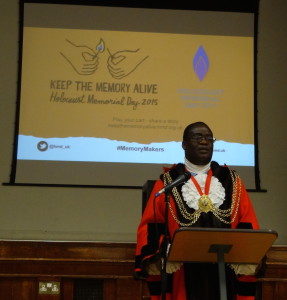
27 January 2015 marked the 70th year since the liberation of Auschwitz-Birkenau, the notorious Nazi concentration and extermination camp in southern Poland. 27 January is also the day of international commemoration of the Holocaust, and subsequent genocides in Cambodia, Rwanda, Bosnia, and Darfur.
Lambeth held its own Holocaust Memorial Day (HMD) event on Sunday 25 January, where diversity was the point of emphasis. Rabbi Janet Darley, of the South London Liberal Synagogue, pointed out that Lambeth being such a mixed borough made this event particularly powerful. ‘People have different religions, ethnicities, and sexual orientations. The power is that we celebrate this diversity, and through it, keep the memory alive.’
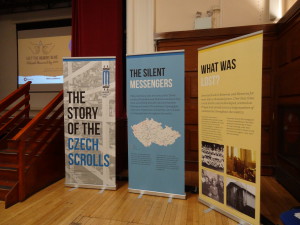
Jerome Freedman, from the Lambeth Community HMD Planning Group, opened with the thoughts that the day was time for everyone to pause, remember, and seek to learn the lessons of the past. Speaking next, Mayor of Lambeth Adedamola Aminu expressed his thanks to the many different faith communities who were present. Dunraven School 6th form students did some readings, and the memorial candle was lit, with musical interludes from Corpus Christi School and South London Liberal Synagogue choirs.
We then watched a short film of Sophal Ear, telling the story of his family’s escape from the Khmer Rouge regime in Cambodia in the late 1970s. This year also marks 20 years since the genocide of Bosnian Muslims in Srebenica, Bosnia, in 1995, said speaker Reverend Alan Gadd, from Faiths together in Lambeth.
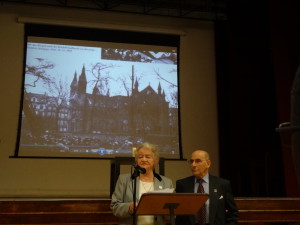
Main speakers Ann and Bob Kirk gave us chilling insights into Nazi Germany, which they survived by leaving on the Kindertransport (Children’s Transport) in 1938-9. In total, 9354 children from mainly Germany, Austria, Poland, and then Czechoslovakia were brought to Britain through this rescue mission. The Kirks related their childhood memories in Berlin, Cologne, and Hanover, and of the anti-Semitism they experienced in the lead up to WW2.
In Kristallnacht, the pogrom across Germany and Austria on November 9th 1938, Jewish people, homes, buildings, and businesses were attacked. Ann’s words describing the day after Kristallnacht in Berlin were particularly moving: ‘the memory of burning synagogues still haunts me today’.
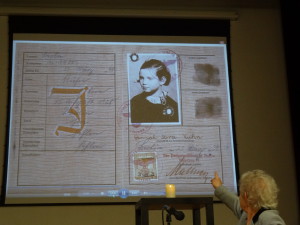
Ann Kirk was born Hanna Kuhn, and Bob was born Robert Kirchheimer. But in their passports, they were named Hanna Sara Kuhn, and Robert Israel Kirchheimer, as Sara and Israel were the names all Jewish children were labeled with to identify them.
Their memories of the Kindertransport journey were also poignant. Ann’s family pretended she was going on an adventure at the train station, and Bob recalls fondly the smiles and sandwiches greeting the children on their first stop in Holland. The Kirks wrote letters to their parents up until the outbreak of the war. After this, they could only exchange 25-word messages on special Red Cross postcards, often censored by the German authorities.
The messages soon stopped. Ann learned that her parents had been sent to Auschwitz, and Bob that his parents had died in a concentration camp in Riga, Latvia.
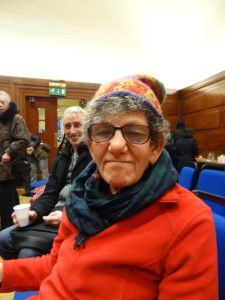
Local lady Helen Fensterheim, attending the event, told me her incredible family history. ‘I’m here today for my dad, really’ – Helen’s father, Samuel Siegfried Carl Fensterheim, escaped from Auschwitz with the help of a German officer. As a lorry driver, he helped to rescue children from Warsaw while transporting sweets from Poland. After this extraordinary story, Helen went on to talk about her mother Laura’s family, who sheltered a German refugee in their home during WW2.
Stephen Derrick, a local resident at the event, had some hopeful words to say: ‘as long as I draw breath, I’ll fight against discrimination. I don’t have any time for people who discriminate.’ As Bob Kirk reminded us, a holocaust happens whenever any group think they are superior to others. We took his strong words home from the Lambeth Holocaust Memorial Day event: ‘Don’t be bystanders. When you see something wrong, speak up’.
Written by Gargie Ahmad, with her photos.

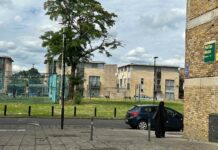
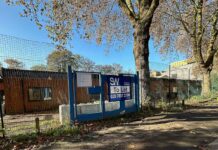
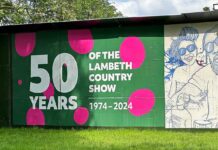



[…] You can read more about this even on the Brixton Blog here. […]